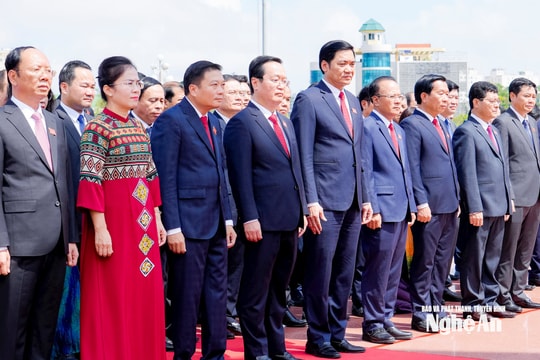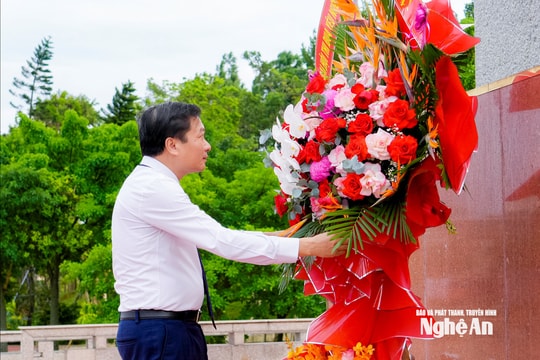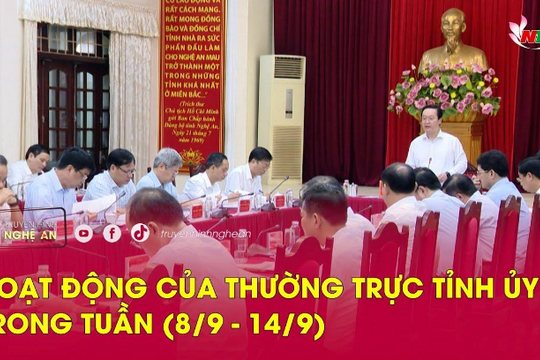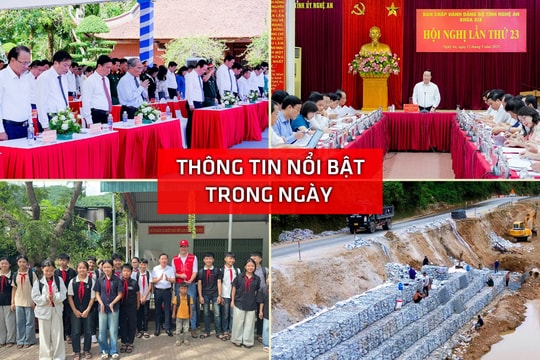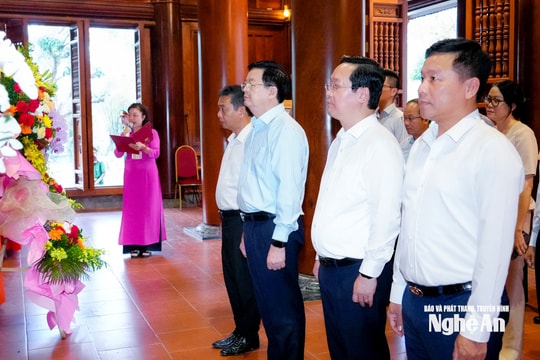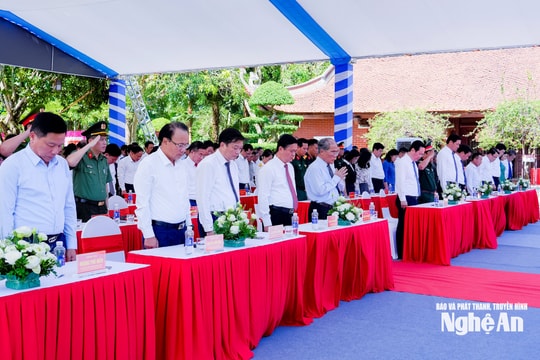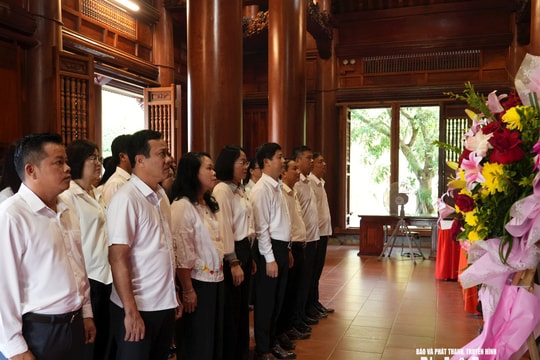Uncle Ho and the Dien Bien Phu Victory
(Baonghean.vn) - Speaking about the significance of the Dien Bien Phu Victory, President Ho Chi Minh commented: "The Dien Bien Phu Victory gloriously ended the long, arduous and heroic resistance war of our people against the French colonialists and the intervention of the American imperialists. It was a great victory of our people, and also a common victory of all oppressed peoples in the world...".
On May 7, 1953, General Henri Navarre (then Chief of Staff of the Army of the North Atlantic Treaty Organization - NATO) was appointed by the French Government to be Commander-in-Chief of the French Army in Indochina. At this time, after 8 years of invading Vietnam, France had lost 390,000 troops and their occupied area was increasingly narrowed. Therefore, Navarre proposed a new military plan in July 1953 with the hope that the French army, which was in a passive defensive situation, would "turn defeat into victory" within 18 months.
Implementing the Navarre Plan, the French army expanded its sweep of the Northern Delta provinces, Binh - Tri - Thien, and the South and concentrated strategic mobile troops in the North to prepare for a major attack on Viet Bac, our Resistance Capital, to gain a decisive victory to quickly end the war in their favor.
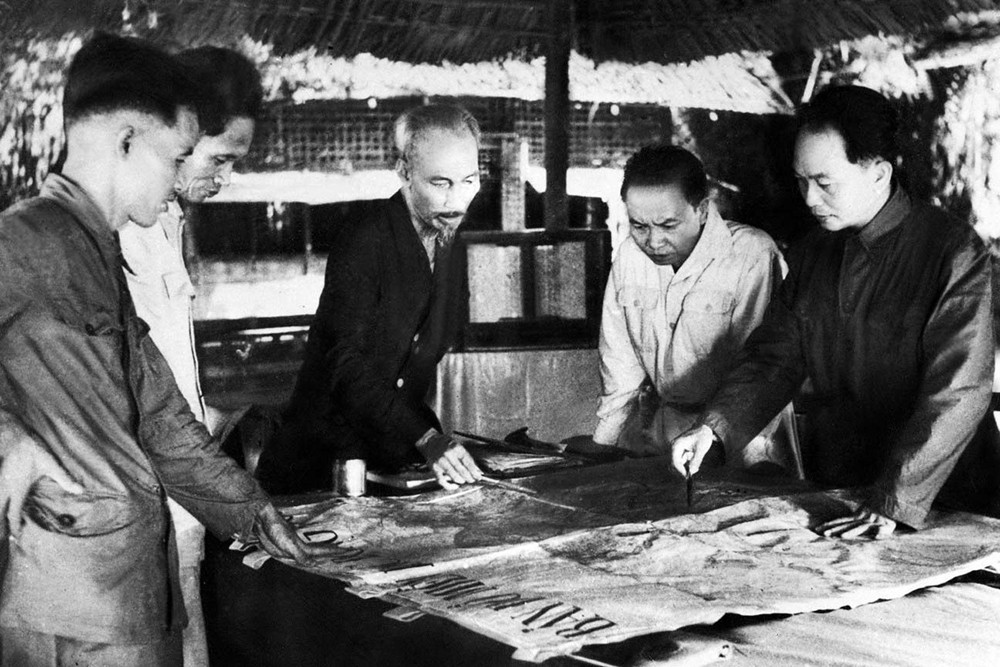 |
| On December 6, 1953, the Politburo held a meeting chaired by President Ho Chi Minh to listen to the General Military Commission's report and final approval of the 1953-1954 Winter-Spring campaign plan, and at the same time decided to launch the Dien Bien Phu Campaign. Photo: VNA |
In October 1953, the Politburo headed by President Ho Chi Minh met to discuss the military mission of Winter - Spring 1953 - 1954. Regarding the Navarre plan, President Ho Chi Minh commented: "If we force them to disperse their forces, that strength will no longer exist."
In November 1953, under the direction of the Politburo and the Central Military Commission, the General Command ordered our troops to advance to the Northwest. Along with the main direction of the Northwest, our troops also attacked Central Laos, Lower Laos, Northern Central Highlands, and Upper Laos. Therefore, the French troops were forced to passively disperse their forces to hold the Northwest (on November 20, 1953, French troops parachuted into Dien Bien Phu), Upper Laos, Lower Laos, Northern Central Highlands, and the Northern Delta.
With the help of the United States, France quickly built Dien Bien Phu into the strongest military base in Indochina. The “Dien Bien Phu gamble” cost more than 40% of the French expeditionary force in Indochina. Both American and French generals believed that the Dien Bien Phu base was an “invincible fortress”.
Therefore, to gain a decisive strategic victory, our army needed to destroy the Dien Bien Phu stronghold to shake to the core the hope of continuing the war of the French colonialists and the American interventionists. On December 6, 1953, the Politburo decided to openDien Bien Phu CampaignPresident Ho Chi Minh stated: “This campaign is a very important campaign not only militarily but also politically, not only domestically but also internationally. Therefore, the entire army, the entire people, and the entire Party must concentrate on completing it successfully.”
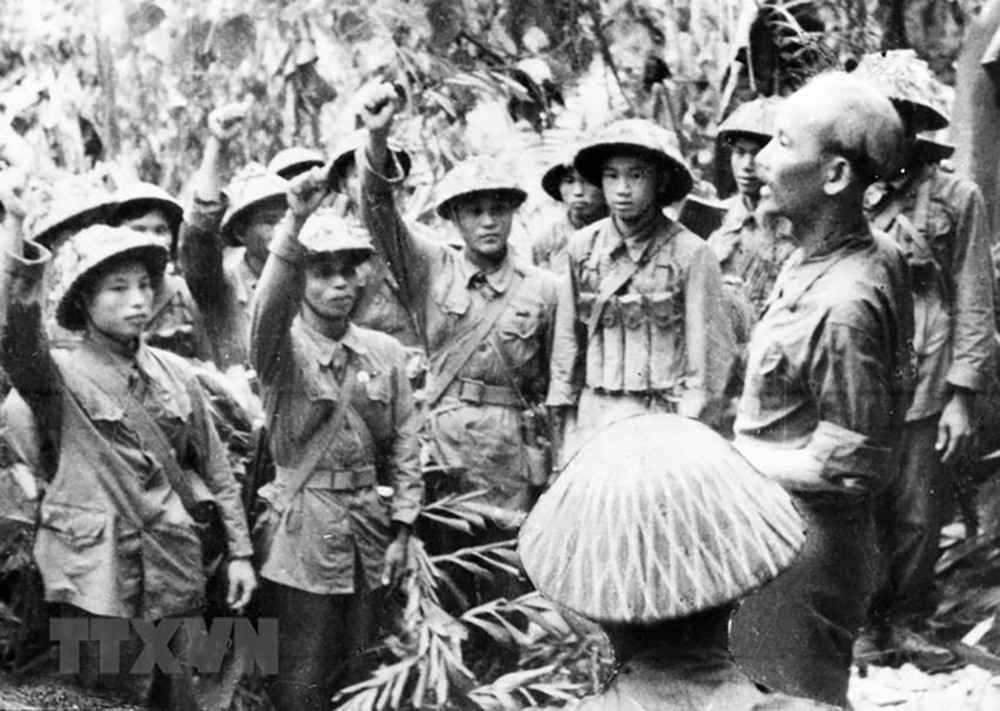 |
| President Ho Chi Minh visited and talked with a military unit participating in the Dien Bien Phu Campaign in 1954. Photo: VNA |
The total number of troops mobilized to participate in the battle at Dien Bien Phu was up to 55,000 soldiers, including 3 infantry divisions (308, 312, 316), Infantry Regiment 57 (Division 304), Engineer - Artillery Division 351. Our Party and Government also mobilized 260,000 laborers, equivalent to 12 million working days to serve the Dien Bien Phu Campaign. The total volume supplied for the Dien Bien Phu Campaign was 30,759 tons of food, provisions, military uniforms, weapons, medical supplies... During the preparation period for the Dien Bien Phu Campaign, we mobilized youth volunteers, laborers together with the army to build 89 km of new roads, repair and upgrade 500 km of roads. On May 7, 1954, after 56 days and nights, our army won a complete victory at Dien Bien Phu.
Speaking about the significance of the Dien Bien Phu Victory (May 7, 1954), at the Special Political Conference (March 1964), President Ho Chi Minh commented: “The Dien Bien Phu Victory gloriously ended the long, arduous and heroic resistance war of our people against the French colonialists and the intervention of the American imperialists. It was a great victory of our people, and also a common victory of all oppressed peoples in the world. The Dien Bien Phu Victory further clarified the truth of Marxism-Leninism in today's era: the imperialists' war of aggression is bound to fail, the liberation revolution of the peoples is bound to succeed”.
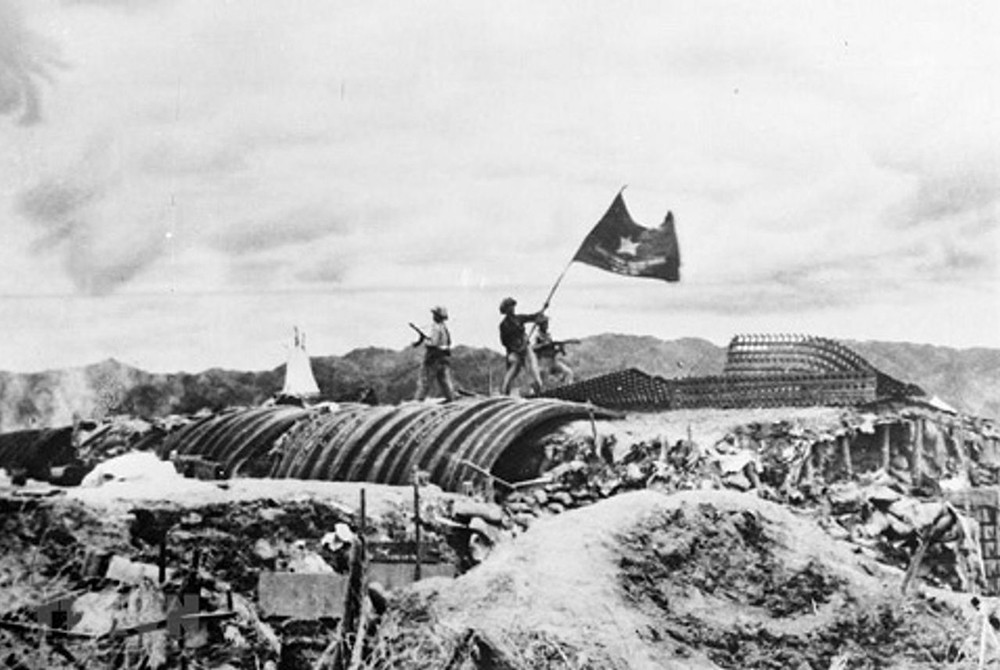 |
| On the afternoon of May 7, 1954, the "Determination to fight - Determination to win" flag of the Vietnam People's Army flew on the roof of General De Castries' bunker. The historic Dien Bien Phu campaign was a complete victory. Photo: VNA |
After the Dien Bien Phu Victoryfamous in five continents, shaking the earth” (May 7, 1954), Comrade William Foster, Chairman of the American Communist Party, wrote in the Workers Daily on May 10, 1954 as follows: “The Ho Chi Minh Army's destruction of the Dien Bien Phu stronghold was an event of great significance. This defeat was not only a disastrous defeat for the French colonialists, who had risked their lives to plot to invade the rich and beautiful Indochina, but first of all, it was a great failure of the American imperialists' aggressive war plan... The victory at Dien Bien Phu was a great encouragement for the forces fighting against imperialism in the colonies and semi-colonies. At the same time, the development in Indochina in the recent period has promoted and strengthened the resistance to the brutal control policy of the United States in other capitalist countries... The liberation of Dien Bien Phu is a crucial victory in the struggle for freedom and world peace”.
The November 22, 1954 issue of Time Magazine (USA) published a portrait of President Ho Chi Minh on its cover and devoted five pages to his life and career, along with Vietnam's victory over France in the Dien Bien Phu Campaign. The magazine emphasized that with this victory, his prestige had "reached a new peak in Asia".
In September 1969, the Central Committee of the African Party for the Independence of Senegal expressed: “We will not forget that President Ho Chi Minh led the heroic Vietnamese people to inflict a decisive defeat on French colonialism, thus promoting and facilitating the awakening of national consciousness and the consciousness of political independence of our country”.
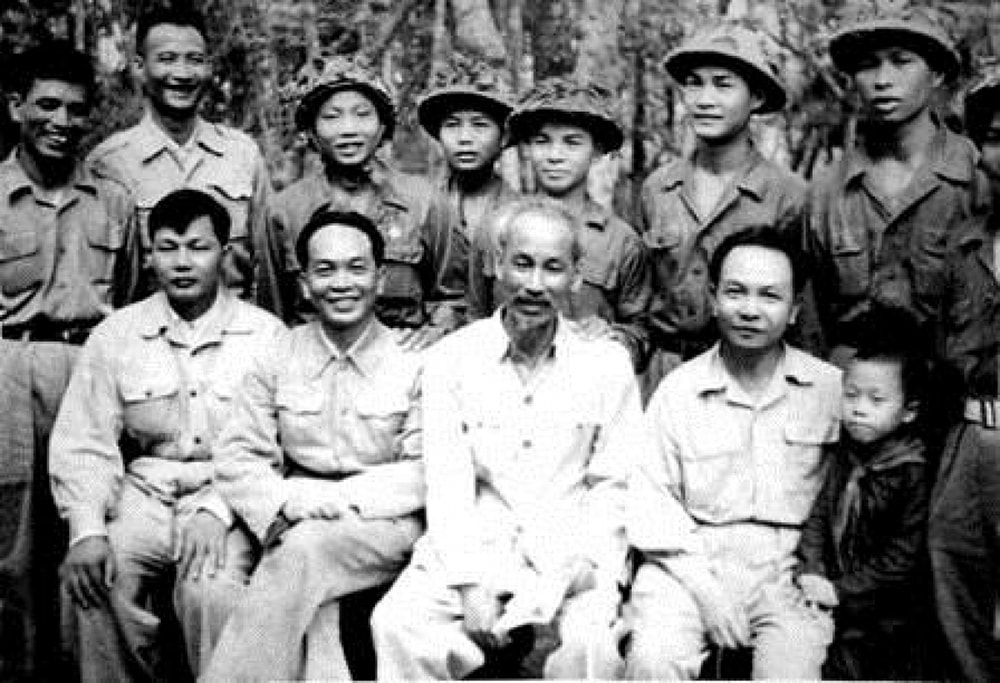 |
| Uncle Ho, General Vo Nguyen Giap and comrade Truong Chinh took a souvenir photo with the delegation of Dien Bien soldiers. Photo archive |
Huari Bumédienne - Chairman of the Revolutionary Council, Chairman of the Council of Ministers of the People's Democratic Republic of Algeria from 1965 to 1978 commented: "President Ho Chi Minh was one of the first revolutionaries who fought against different forms of colonialism and imperialism and was one of those who, by his words and actions, crushed brutality and contributed to the just cause of oppressed peoples all over the world"...
In 1987, the United Nations Educational, Scientific and Cultural Organization (UNESCO) honored President Ho Chi Minh as a national liberation hero and an outstanding cultural figure and recommended that member countries organize a commemoration of him worldwide in 1990, on the occasion of the 100th anniversary of his birth. At the International Conference commemorating the 100th anniversary of President Ho Chi Minh's birth in 1990, Dr. M. Ahmed - Director of UNESCO in charge of the Asia-Pacific cultural region emphasized: "He will be remembered not only as a liberator of the Fatherland and of the colonized humanity but also as a modern philosopher who brought new perspectives and hopes to those who fought relentlessly to eliminate injustice and inequality from this earth".

